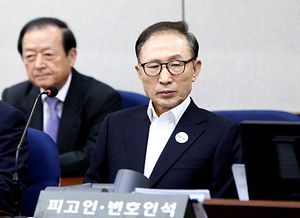Ex-South Korean President Lee Myung-bak was sentenced to 15 years in prison last week on charges of bribery and embezzlement, joining the ignominious list of South Korean leaders to face jail time after their term. That this list keeps getting longer does not necessarily mean those who assume the highest public office in South Korea are doomed to the same fate; rather it underscores the need for changing the rules of the game.
Lee was found guilty of taking bribes worth millions of dollars in exchange for political favors while in office and embezzling about $21 million from an auto-parts company before becoming president. He was ordered to pay a fine of $11.5 million in addition to his time in prison. Much like it was for former President Park Geun-hye’s 2017-2018 trial, Samsung was again central to the court proceedings. Samsung Chairman Lee Kun-hee was convicted of tax evasion in August 2009 but was pardoned by then-President Lee Myung-bak, who cited Chairman Lee’s importance to securing a successful bid for the 2018 Winter Olympics in PyeongChang. However, the court found ex-President Lee received around $5.4 million in bribes from Samsung for the pardon.
The conservatives Lee and Park may be the latest South Korean leaders to face a business-centered scandal after leaving office, but former presidents on the other side of the aisle have also been caught up in the same phenomenon. As the progressive Kim Dae-jung was leaving office in 2003, news emerged that his summit with North Korean leader Kim Jong Il was aided by a $500 million payment to North Korea through Hyundai-Asan. After his term ended, Kim Dae-jung’s liberal successor, Roh Mooh-hyun, was embroiled in a bribery scandal that led to his suicide.
Current South Korean President Moon Jae-in was largely elected on a mandate of social and economic reform, which included addressing close relations between politicians and chaebol executives. Moon has made major strides in implementing policies to foster more inclusive growth – though not without challenges in achieving the intended outcomes – but he has so far been unable to tackle rules empowering ties between business and political leaders. This may prove not be a problem for Moon, who has built a reputation as a clean and honest politician. But, without constitutional or chaebol reforms, future cases of corruption in the presidency will likely continue to come to light after the fact rather than be prevented.
Close connections between chaebols and politicians are a legacy of South Korea’s developmental state, which helped transform a relatively impoverished county to one of the most advanced economies in the world. Under this system, politicians largely directed chaebol production and undertook measures to support domestic industrial growth, such as underwriting risk through government-backed bank loans and discouraging foreign competition. Structural reforms associated with IMF loans amid the Asian Financial Crisis snuffed out much of this formal dynamic; however, the underlying mindset has arguably persisted.
To reliably break the cycle of corruption, the concentrated power of both the president and business executives should be diluted through constitutional and chaebol reforms. Moon promised both, but has faced challenges fulfilling each.
Moon’s attempt to reform the South Korean Constitution this year was blocked by the main opposition party, which claimed his proposed changes did not go far enough to limit presidential power. Moon’s proposal decreased the current five year term for a president to four years and would have allowed for a possible re-election – effective only after Moon completed his tenure under current rules. The plan also would have granted local governments more power by giving them greater control of their budgets. Moon’s intention was for the proposal to be voted on in a national referendum in June, but the Liberty Korea party prevented it from getting to the ballot by holding up a necessary provision to change the law on referendums in the National Assembly. There has been little public discussion since on an arrangement both sides can agree to.
Chaebol reform – with help from investors – looks more promising, but there is still some way to go. The seemingly most effective way to constrain chaebol executives is to empower shareholders. Investors have long complained that the interests of a chaebol’s controlling family are disproportionately favored, often resulting in inefficiencies and limiting returns. South Korea’s Fair Trade Commission has recently stepped up its efforts to target rules that have allowed the families of chaebol founders to maintain outsized control. South Korea’s National Pension Service, the largest domestic investor, may also play a more active role in influencing business decisions after adopting the stewardship code – guidelines outlining that institutional investors will engage in corporate decision-making in the interest of beneficiaries.
Despite these developments, there are still signs of skepticism about positive change for chaebol governance. The KOSPI 200, which tracks the stock value of the 200 largest companies in South Korea, continues to trade far below comparable indexes in other markets, at least in part due to how chaebols are structured. The centrality of chaebols to Moon’s planned inter-Korean economic engagement also has some concerned that this is taking the wind out of the sails for internal reforms.
South Korea has come a long way in the past 70 years, but old habits die hard. If the country doesn’t want to risk more leaders winding up in jail, rules allowing the old ways of doing business must be left behind.

































